Nacho Typical Elvis Story

“Thankyvermuch.”
One of the oldest of my stories in A Consternation of Monsters is “The King’s Last Nacho.” Like “The Wise Ones,” which precedes it in the order of stories, this was one of the stories I first drafted during my college years at Mississippi State University. Unlike “The Wise Ones,” however, it did not begin life in a creative writing class, but started out in a different medium altogether–that of comic books.
I’ve aspired to have many careers in life, from detective to disc jockey (one of which I did for a few years and one of which I may one day achieve), but I can mark the moment in my life when I first wanted to become a comic book writer. It was the day I first read an article in Writers Digest by a man who would one day become one of my all time favorite television writers (though I’d seen some of his work already at that point), J. Michael Straczynski, creator and primary writer for the TV series Babylon 5. And, of course, the article he wrote was about the mechanics of writing scripts for comics.
Though I’ve been a life long fan of comics, I had only vaguely wondered at that point what the process of writing a comic book was like. I had long known that they were frequently a different person from the artist, and I was already a big fan of a handful of comic book writers, such as Keith Giffen, John Ostrander, Mark Evanier, Larry Hama, John Byrne, etc. I had even begun a budding fascination with the work of Alan Moore, but I’d had few aspirations in the comic writing arena myself. The Writers Digest issue, though, in which JMS explained his own learning process in writing his first ever comic book, issue #13 of Teen Titan’s Spotlight from 1987, was fascinating to me. The article featured examples of his script pages as they compared to the finished comic book pages, showing how the description of the action was written panel by panel, with dialogue added beneath that to show how many dialogue balloons would be in a given panel, etc. It was an article that I devoured and re-read dozens of times. It was really then that it dawned on me that there were folks in the world who wrote comic books for a living and I could possibly be one of them. I shortly set out to try and come up with ideas for comics.
I was initially inspired by books like Giffen’s Justice League International, which told oftentimes serious stories, but the humorous take on the characters provided by Giffen, J.M. DeMatteis, and artist Kevin Maguire. Since DC and Marvel would pay the most, I tried to think of stories for existing DC Comics characters. (The one I remember of these was a grim & gritty version of DC’s The Inferior Five, which begins years after they broke up; Merryman has been institutionalized, Dumb Bunny turned out to be a scientific genius who had been chemically suppressing her intellect, and the Blimp went missing after floating into the Bermuda Triangle.) Later on, once I’d read such works as Watchmen, V for Vendetta, The Sandman, and had Grant Morrison forcibly expand my horizons in his run on Doom Patrol, I began to think a bit more broadly than deconstructionist parody.

Now, I’d been making up my own comic book style characters for years, so I had original properties to my name. One of these characters was a guy called The Kindred Spirit. He was inspired by such mysterious trench-coaty types as The Phantom Stranger, but with the twist that he was just this slobby, cigar-chomping fat guy, whose trench coat was stained and whose hat was burnt. It’s what would happen if the Phantom Stranger were played by the guy who played Ekhardt in Tim Burton’s Batman, and with a little Columbo thrown in for good measure. In my initial conception of him, he was either an angel or the closest thing to one, and was an agent of a cosmic/possibly heavenly organization called The Higher Power, though he would occasionally freelance. Mostly, he was a down to earth guy who knew the secrets of the universe, but wasn’t an asshole about it. He traversed the cosmos through the use of a bottle of dimension fluid, which, when poured upon the ground in a circle, could open portals to other realms, or span vast distances. I imagined that he knew all the other big enlightened and ascended master types in the universe, but none of them really liked him much. Not that he cared. They were too stuffy for him. He was more interested in smoking, drinking and having adventures.
Some time in the mid 1990s, Gun Dog Comics, the formerly existing comic shop in Starkville, MS, decided to get into the publishing business. They next announced that they were putting together an anthology book with different writers and artists. Rob Snell, co-owner of Gun Dog, asked me if I’d be interested in submitting something. I think I suggested the name of the only comic artist I knew, Eric Yonge, a guy I went to high school whose work was fantastic and who I’d wanted to work with since first seeing his spot-on cartoon sketches of our math teacher, Mr. Murphy, which he’d drawn on Mr. Murphy’s overhead projector. Turns out, they already knew Eric and had recruited him way before me.
I decided Kindred Spirit was the character to use for my comic submission. And my story idea was to have Kin take a freelance bounty-hunting gig to recapture the very much alive Elvis Presley, who had escaped back to Earth. (Remember, this was only a few years after a major wave of the whole Elvis faked his death theories were in the news.) And, for reasons I’m not entirely clear on now, I decided to set this faceoff at a professional wrestling match in Memphis. I started writing.
The Snells were shooting for an anthology of 8-page comic stories. I tried to cram as much of mine into those 8 pages as possible, but there’s a lot of conversation that just couldn’t fit. Rob, an artist himself, pointed out that I was going to have to leave some room in the comic panels for actual art at some point, so I was going to have to do some serious editing of my dialogue. I turned in a few drafts which were kicked back to me for more editing. I begged for more pages, but wisely they refused. If I couldn’t tell the story in 8 pages then it wasn’t a story they wanted. Eventually I managed to turn in a draft that Rob said was getting closer to workable, but still had a ways to go. (Somewhere, I’m sure I have a 3.5″ floppy that contains this gem of a story. Or, possibly even a 5.25″ diskette, as I think I was still writing on a Kaypro 4 back then. What I don’t seem to have is a paper script I can lay hands on.)
At some point, the Snells decided to put the idea of a comic anthology on the back burner. I suspect they realized that if they had an artist as talented as Eric Yonge on hand, what they needed to be doing was publishing more of his work. He’d already done some small press comics for them about a secret agent character he’d created called Gunner. Gun Dog bumped this up to a full size comic, published it, distributed it through Diamond and made a nationally released book of it. Ultimately, they published a few issues of Gunner, all of which I bought. The anthology comic, though, remained on the back burner of their creative stove. And then the stove itself was eventually sold and Gun Dog closed its doors in the early 2000s. (Fun fact: Gun Dog also published the first mini-series of Larry Young’s Astronauts in Trouble: Live from the Moon in 1999, which eventually was republished under it’s creator’s own publishing company, AIT/Planet Lar.)
Having the basic idea for this story that refused to fit into 8 pages, though, I decided to let it stretch its legs a bit as a prose story. I took my original draft, with all the sprawling dialogue, and wrote around it even more sprawling prose description. I threw everything against the wall, every commentary on human nature I possessed in my wee, college junior, 21-year-old mind, as well as jokes about Elvis movies that I hadn’t even seen at that point, some of which turned out to be wildly inaccurate. (There ARE clams seen in Clambake, for instance. Somewhere along the way, I heard that there were not and thought the irony funny. Irony only works well, though, when it is shown against the context of reality.) There were more nacho jokes, too, with an extended sequence in which Kindred Spirit craves Elvis’s last nacho in a bad way and Elvis holds it to his mouth, threatening to consume it for most of a page before crushing the fat man’s hopes by eating it. That got toned down later. The wrestling match, which had been generic in the original comic script, became another layer in the storytelling with the addition of real life wrestler Jerry “The King” Lawler. (Cedric Hinds is an echo of a no-name mid-`90s wrestler named Edric Hines, about whom I can no longer find references online–meaning he’s REALLY no name now.) In the end, it was essentially the same story as my comic script idea, but the method of achieving it is a little different. Probably my favorite change from the original version to the prose story is the title. I don’t recall my original title for the comic story, if it even had one, but “The King’s Last Nacho” landed and stuck hard.
I’ve revised the story a number of times over the years since then, going back to Rob Snell’s advice to edit, edit and reedit. It was reduced from an indulgent 25 pages, down to 21 pages, and then down to 18 while doing final edits for the collection. The major decision I had, though, was whether or not to include it in the collection at all. Those of you who’ve read it might be under the impression the my dilemma was due to the story containing no monsters; just Elvis, a fat cosmic guy, a couple of wrestlers and an arena full of spectators. There is, I assure you, a very big monster present, though. It may not seem as obvious as some of the others in the collection, but it’s huge, has tremendous fangs and claws, is incredibly destructive to humanity, and has been around for centuries. You may still have to squint to see it. Regardless, I just wasn’t sure if the story fit thematically with the other stories. It doesn’t have the same creepy factor that the others tend to, so it felt a little out of place. I even had other stories that had big obvious monsters in them that I declined to include in this collection in favor of Nacho. In the end, it’s just one of my favorite of my stories and I wanted it in there regardless of the monster squint factor.
I have not recorded a podcast version of this story, and likely won’t. But I might get around to posting an audio sample of it from the forthcoming audio book version of A Consternation of Monsters, (which I am even as I type this avoiding some audio-editing for). It’s nearly half way there.

 I think Terry would have liked to have seen Chally playing his namesake in this play. Lord knows Terry himself would never have taken the role. I managed to recruit him to play a role in some plays by Joe McCabe that we did at the writers conference one year, but he didn’t take the stage without some liquid courage from a mason jar beforehand.
I think Terry would have liked to have seen Chally playing his namesake in this play. Lord knows Terry himself would never have taken the role. I managed to recruit him to play a role in some plays by Joe McCabe that we did at the writers conference one year, but he didn’t take the stage without some liquid courage from a mason jar beforehand.

 I just finished recording the audio version of my short story “The Wise Ones,” from A Consternation of Monsters. Unlike most of my audio efforts, this was a particularly annoying recording session because my stomach refused to stop gurgling throughout it.
I just finished recording the audio version of my short story “The Wise Ones,” from A Consternation of Monsters. Unlike most of my audio efforts, this was a particularly annoying recording session because my stomach refused to stop gurgling throughout it.




![Pageflex Persona [document: PRS0000030_00047]](https://mrherman.com/wp-content/uploads/2015/10/constermoore2.jpg)







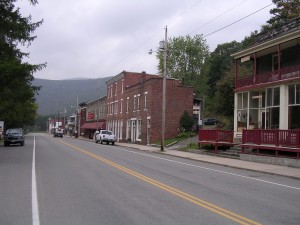

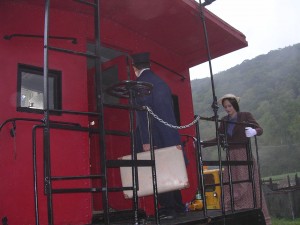
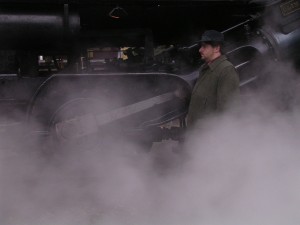
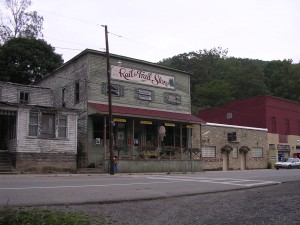
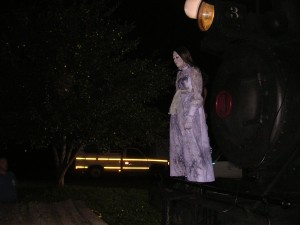
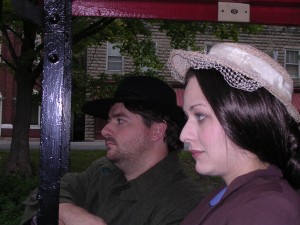
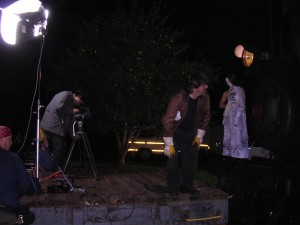


 about the case of the ghost and propose a few theories about it. She, unaware of who was playing the conductor, supposed that he may have been the guy to kill the girl who became the ghost and not the guy Devin was playing at all. The funny thing is, the producers took footage from the scene where I was leading Jessica to her seat in the train and were able to zoom in and freeze on a micro expression on my face that looked a little bit sinister in order to have visual record to help shore up Susan’s theory. I never made the expression intentionally, but for a second my face registered something dark all the same.
about the case of the ghost and propose a few theories about it. She, unaware of who was playing the conductor, supposed that he may have been the guy to kill the girl who became the ghost and not the guy Devin was playing at all. The funny thing is, the producers took footage from the scene where I was leading Jessica to her seat in the train and were able to zoom in and freeze on a micro expression on my face that looked a little bit sinister in order to have visual record to help shore up Susan’s theory. I never made the expression intentionally, but for a second my face registered something dark all the same.